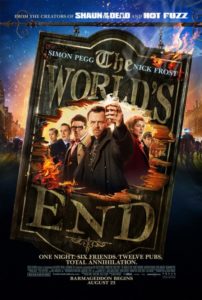The World’s End (2013)
4/5
Edgar Wright has made a name for himself by making razor-sharp, tightly wound comedies that do what most comedies of late don’t do: make us laugh. (And, at the risk of being branded an old fogey, I’ll say that Wright achieves this in a much cleaner, more civilized manner than many films today.)
His Cornetto trilogy (Shaun of the Dead (2004), Hot Fuzz (2007), and The World’s End), co-written with Simon Pegg (who also stars in them) is his best work. These movies have the comedic nuances of the great Arrested Development, in the far superior movie format; of the three, The World’s End demonstrates both of these points most emphatically.
The opening sequence is nothing shy of brilliant, Wright setting the tone with his usual fast-paced editing and use of decidedly clever scene transitions. Throughout the film, the Wright/Pegg writing team packs in as many jokes and references as possible, and the musical selection is so integral to the film that it is often written into the dialogue. Even the colour palette is engaging (unlike, say, the dull War Dogs [2016] or the bland The Free State of Jones [2016]), with the picture saturated and moody—the blacks black, and (most importantly) the ambers amber. No film has ever made me want aa good old-fashioned pint more than The World’s End, which is in no small part due to the photography—it’s rich, warm, and delicious.
But what sets The World’s End apart from its brothers Shaun of the Dead and Hot Fuzz is its tone, which substitutes young-man’s courageousness for middle-aged weariness.
It’s in this shift that The World’s End achieves more than just 90 minutes of laughs. There are undercurrents of sadness and questions about the meaning of life running beneath the alcohol-fuelled madness that tramples about on the surface.
And, yes, in keeping with the Cornetto way, there are wild and zany left hooks in the story that many may take as opportunity to write the film off. Do not do this. Or at least try not to do this.
I know that there are aspects here that will not appeal to everyone; after all, it is a —I’ll just say it—sci-fi comedy. But, whereas most sci-fi films get rather carried away in their own worlds, The World’s End makes it clear that it knows that its sci-fi element is a tad idiotic, and therefore never loses sight of what its message is.
In the end, that message is one of unity—unity of friendship, family, humanity—and the, frankly, idiotic measures humans will go to sometimes to attain and prolong their sense of unity.
It’s a funny point, but one that stuck with me for its truth and honesty, making The World’s End one of the few comedies that I’ve appreciated for more than its sense of humour.

